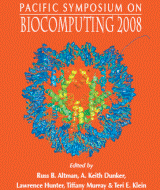Intrinsic Evaluation of Text Mining Tools May Not Predict Performance on Realistic Tasks
J. Gregory Caporaso1, Nita Deshpande2, J. Lynn Fink3, Philip E. Bourne3, K. Bretonnel Cohen1, and Lawrence Hunter1
1Center for Computational Pharmacology
University of Colorado Health Sciences Center, Aurora, CO, USA,
2PrescientSoft Inc., San Diego, CA, USA,
3Skaggs School of Pharmacy and Pharmaceutical Sciences
University of California, San Diego, San Diego, CA, USA
Pac Symp Biocomput. 2008;:640-651.

Abstract
Biomedical text mining and other automated techniques are beginning to achieve performance which suggests that they could be applied to aid database curators. However, few studies have evaluated how these systems might work in practice. In this article we focus on the problem of annotating mutations in Protein Data Bank (PDB) entries, and evaluate the relationship between performance of two automated techniques, a text-mining-based approach (MutationFinder) and an alignment-based approach, in intrinsic versus extrinsic evaluations. We find that high performance on gold standard data (an intrinsic evaluation) does not necessarily translate to high performance for database annotation (an extrinsic evaluation). We show that this is in part a result of lack of access to the full text of journal articles, which appears to be critical for comprehensive database annotation by text mining. Additionally, we evaluate the accuracy and completeness of manually annotated mutation data in the PDB, and find that it is far from perfect. We conclude that currently the most cost-effective and reliable approach for database annotation might incorporate manual and automatic annotation methods.
[Full-Text PDF] [PSB Home Page]